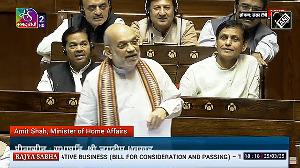The US India Business Council has submitted to Union Finance Minister P Chidambaram a wish list of reforms in the taxation sector, which the industry body argues would create a fair and transparent tax environment.
 In its pre-budget memorandum submitter to the Union Finance Minister, US India Business Council asked Chidambaram to ensure that any changes to India's income tax law "will not be retrospective", as well as "provide clarification" that recent changes to that effect will be legally binding and not subject to arbitrary application.
In its pre-budget memorandum submitter to the Union Finance Minister, US India Business Council asked Chidambaram to ensure that any changes to India's income tax law "will not be retrospective", as well as "provide clarification" that recent changes to that effect will be legally binding and not subject to arbitrary application.
Prominent among the wish list include updating India-US bilateral tax treaty, emanation of double taxation on software revenue, 15 year tax holiday for software technology parks and special economic zones.
It also calls for ensuring that transfer pricing principles are applied in fair and consistent manner for all tax payers and an assurance that any change in the income tax law will not be retrospective.
Commending the proposal of important clarifications by the Prime Minister's Expert Committee on GAAR and the recent decision to defer implementation until 2016, USIBC said in order to plan long-term capital allocation and employment- generating investment into India, global investors look forward to final confirmation of these guidelines at the earliest point possible.
"While the proposed guidelines have granted substantial assurances, global companies require predictability and remain concerned about how such assurances will translate into law," USIBC said in its memorandum.
Of the believe that Goods and Services Tax ( GST) would dramatically increase government revenue while streamlining operational and cost planning for business, while potentially decreasing some tax rates, USIBC said it remains prepared to support the development and expeditious implementation of a revised DTC (Direct Taxes Code).
"An updated, harmonized direct tax framework would have tremendous multiplier effects to fiscal balance and macroeconomic stability, which clearly benefits consumers, domestic industry, and global investors in India," it said.
USIBC said one of the primary frustrations of foreign multinational companies investing in India is an often inconsistent transfer pricing regime and a lack of a predictable, efficient dispute resolution mechanism.
As such it asked the Finance Minister to ensure that transfer pricing principles are applied in a fair and consistent manner for all taxpayers, as well as allow a reasonable method for determining transfer pricing comparables to support fees on services performed in India for non-Indian affiliated entities that match the nature of the company's services performed.
"As international norms dictate, transfer pricing principles should never be viewed as a selective and arbitrary mechanism for raising revenues," it said.
"In the interim, we believe the GOI and the US government should consider adopting alternative dispute resolution procedures to more efficiently and expeditiously resolve tax disputes. Specifically, the two governments could consider an MOU for Binding Arbitration," USIBC said.
Noting that the India-US bilateral tax treaty has not been updated in 20 years, USIBC argued making necessary changes could significantly improve the current tax climate through modernized provisions that reflect the reality of the economic relationship between the US and India.
To facilitate cross-border trade and investment without the barrier of double taxation, India and US should reaffirm the shared commitment to improve tax dispute resolution.
In its memorandum, USIBC requests the Finance Minister to amend the Finance Bill to reduce the withholding tax on software revenues to allow the segment of the market subject to withholding to resume.
To eliminate double taxation faced by software and service companies, India should resolve the duplicate taxation of software as a service for service tax purposes and as a good for excise tax purposes.
In addition to asking the Finance Minister to continue the Software Technology Parks (STP) Initiative, which expired in 2011, USIBC has suggested granting a complete income tax holiday to STP units (on lines similar to SEZ), including a 15 year tax holiday without a sunset clause, exemption from DDT and MAT, and; relaxing the terms and conditions applicable for setting up captive IT/ITES SEZs.
Further to make investments in Indian equity markets more appealing to US investors, especially in light of the recent Qualified Foreign Investor Framework, USIBC recommend that the India-US Double Taxation Avoidance Agreement be amended to eliminate this capital gain tax to US investors.
This tax treatment would also apply to investors in mutual funds that are investing in Indian equity investments, it said.






 © 2025
© 2025